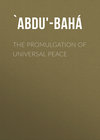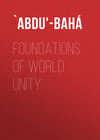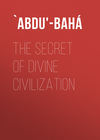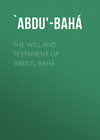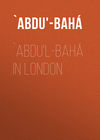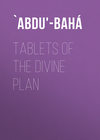Loe raamatut: «The Promulgation of Universal Peace», lehekülg 26
Therefore, we must give praise unto God, for it is the light of His bounty which has shone upon us through His love which is everlasting. His divine Manifestations have offered Their lives through love for us. Consider, then, what the love of God means. Were it not for the love of God, all the spirits would be inanimate. The meaning of this is not physical death; nay, rather, it is that condition concerning which Christ declared, “Let the dead bury their dead,” for “That which is born of the flesh is flesh; and that which is born of the Spirit is spirit.” Were it not for the love of God, the hearts would not be illumined. Were it not for the love of God, the pathway of the Kingdom would not be opened. Were it not for the love of God, the Holy Books would not have been revealed. Were it not for the love of God, the divine Prophets would not have been sent to the world. The foundation of all these bestowals is the love of God. Therefore, in the human world there is no greater power than the love of God. It is the love of God which has brought us together here tonight. It is the love of God which is affiliating the East and the West. It is the love of God which has resuscitated the world. Now we must offer thanks to God that such a great bestowal and effulgence has been revealed to us.
We come to another aspect of our subject: Are the workings and effects of love confined to this world, or do they extend on and on to another existence? Will its influence affect our existence here only, or will it extend to the everlasting life? When we look upon the human kingdom, we readily observe that it is superior to all others. In the differentiation of life in the world of existence, there are four degrees or kingdoms: the mineral, vegetable, animal and human. The mineral kingdom is possessed of a certain virtue which we term cohesion. The vegetable kingdom possesses cohesive properties plus the power of growth, or augmentative power. The animal kingdom is possessed of the virtues of the mineral and vegetable plus the powers of the senses. But the animal, although gifted with sensibilities, is utterly bereft of consciousness, absolutely out of touch with the world of consciousness and spirit. The animal possesses no powers by which it can make discoveries which lie beyond the realm of the senses. It has no power of intellectual origination. For example, an animal located in Europe is not capable of discovering the continent of America. It understands only phenomena which come within the range of its senses and instinct. It cannot abstractly reason out anything. The animal cannot conceive of the earth being spherical or revolving upon its axis. It cannot apprehend that the little stars in the heavens are tremendous worlds vastly greater than the earth. The animal cannot abstractly conceive of intellect. Of these powers it is bereft. Therefore, these powers are peculiar to man, and it is made evident that in the human kingdom there is a reality of which the animal is lacking. What is that reality? It is the spirit of man. By it man is distinguished above all the other phenomenal kingdoms. Although he possesses all the virtues of the lower kingdoms, he is further endowed with the spiritual faculty, the heavenly gift of consciousness.
All material phenomena are subject to nature. All material organisms are captives of nature. None of them can deviate in the slightest from the laws of nature. This earth, these great mountains, the animals with their wonderful powers and instincts cannot go beyond natural limitations. All things are captives of nature except man. Man is the sovereign of nature; he breaks nature’s laws. Though an animal fitted by nature to live upon the surface of the earth, he flies in the air like a bird, sails upon the ocean and dives deep beneath its waves in submarines. Man is gifted with a power whereby he penetrates and discovers the laws of nature, brings them forth from the world of invisibility into the plane of visibility. Electricity was once a latent force of nature. According to nature’s laws it should remain a hidden secret, but the spirit of man discovered it, brought it forth from its secret depository and made its phenomena visible. It is evident and manifest that man is capable of breaking nature’s laws. How does he accomplish it? Through a spirit with which God has endowed him at creation. This is a proof that the spirit of man differentiates and distinguishes him above all the lower kingdoms. It is this spirit to which the verse in the Old Testament refers when it states, “And God said, Let us make man in our image, after our likeness.” The spirit of man alone penetrates the realities of God and partakes of the divine bounties.
This great power must evidently be differentiated from the physical body or temple in which it is manifested. Observe and understand how this human body changes; nevertheless, the spirit of man remains ever in the same condition. For instance, the body sometimes grows weak, it becomes strong or stout, sometimes it grows smaller or may be dismembered, but there is no effect upon the spirit. The eye may become blind, the foot may be amputated, but no imperfection afflicts the spirit. This is proof that the spirit of man is distinct from his body. Defects in the body or its members do not imply defects in the spirit. This leads to the accurate conclusion that if the whole body should be subjected to a radical change, the spirit will survive that change; that even if the body of man is destroyed and becomes nonexistent, the spirit of man remains unaffected. For the spirit of man is everlasting. Sometimes the body sleeps, the eyes do not see, the ears do not hear, the members cease to act, every function is as inactive as death; nevertheless, the spirit sees, hears and soars on high. For it is possessed of these faculties which operate without the instrumentality of the body. In the world of thought it sees without eyes, hears without ears and travels without the motion of foot. Without physical force it exercises every function. This makes it evident that during sleep the spirit is alive though the body is as dead. In the world of dreams the body becomes absolutely passive, but the spirit still functions actively, possessed of all susceptibilities. This leads to the conclusion that the life of the spirit is neither conditional nor dependent upon the life of the body. At most it can be said that the body is a mere garment utilized by the spirit. If that garment be destroyed, the wearer is not affected but is, in fact, protected.
Furthermore, all phenomena are subject to changes from one condition to another, and the revolution caused by this transformation produces a form of nonexistence. For instance, when a man is transformed from the human kingdom to the mineral, we say that he is dead, for he has relinquished the physical form of man and assumed the condition of the mineral substances. This transformation or transmutation is called death. Therefore, it follows that no phenomenal organism can be possessed of two forms at the same time. If an object or phenomenon presents a triangular shape, it cannot simultaneously possess the shape of a square. If it is spherical, it cannot at the same time be pentagonal or hexagonal. In order to assume any given figure or form it must relinquish its previous shape or dimension. Thus the triangular must be abandoned to assume the square; the square must change to become a pentagon. These transformations or changes from one condition to another are equivalent to death. But the reality of man, the human spirit, is simultaneously possessed of all forms and figures without being bereft of any of them. It does not require transformation from one concept to another. Were it to be bereft of one or all figures, we would then say it has been transferred to another, and this would be equivalent to death. But as the human spirit possesses all the figures simultaneously, it has no transformation or death.
Again, according to natural philosophy it is an assured fact that single or simple elements are indestructible. As nature is indestructible, every simple element of nature is lasting and permanent. Death and annihilation affect only compounds and compositions. That is to say, compositions are destructible. When decomposition takes place, death occurs. For example, certain single elements have combined to make this flower. When this combination is disintegrated, this composition decomposed, the flower dies as an organism of the vegetable kingdom. But the single elements of which this flower is composed do not suffer death, for all single elements are permanent, everlasting and not subject to destruction. They are indestructible because they are single and not compound. Thus they cannot disintegrate nor become separated in their component atoms but are single, simple and, therefore, everlasting.
If an elementary substance is possessed of immortality, how can the human spirit or reality, which is wholly above combination and composition, be destroyed? Nay, rather, that spirit, which is all in all, is a unit and not a compound. Its destruction, therefore, is not possible. The spirit of man transcends the qualities and attributes of any natural element. It is greater in attributes than gold, silver or iron, which are single elements and indestructible. As they are free from destruction and qualified with permanence, how much more so is the human spirit free and immortal. How will that ever be destroyed? This is a subject of great importance. There are innumerable proofs in support of it. I hope we may continue it at another time.
Before we leave, I desire to offer a prayer in behalf of Miss Farmer; for, verily, she has been the founder of this organization, the source of this loving fellowship and assemblage.
O Thou kind God! Encircle these servants with the glances of Thy providence. Set aglow the hearts of this assemblage with the fire of Thy love. Illumine these faces with the light of heaven. Enlighten these hearts with the light of the most great guidance.
O God! The clouds of superstitions have covered the horizons of the hearts. O Lord! Dispel these clouds so that the lights of the Sun of Reality may shine. O Lord! Illumine our eyes so that we may behold Thy light. O Lord! Attune our ears so that we may hear the call of the Supreme Concourse. O Lord! Render our tongues eloquent so that we may become engaged in Thy commemoration. O Lord! Sanctify and purify the hearts so that the effulgence of Thy love may shine therein.
O Thou kind Lord! Bestow quick recovery through Thy power and bounty upon the founder of this Association. O Lord! This woman has served Thee, has turned her face toward Thy Kingdom and has established these conferences in order that reality might be investigated and the light of reality shine.
O Lord! Be Thou ever her support. O Lord! Be Thou ever her comforter. O Lord! Bestow upon her quick healing. Verily, Thou art the Clement. Verily, Thou art the Merciful. Verily, Thou art the Generous.
17 August 1912
Talk at Green Acre
Eliot, Maine
Notes by Edna McKinney
The physical beauty of this place is very wonderful. We hope that a spiritual charm may surround and halo it; then its beauty will be perfect. There is a spiritual atmosphere manifest here particularly at sunset.
In cities like New York the people are submerged in the sea of materialism. Their sensibilities are attuned to material forces, their perceptions purely physical. The animal energies predominate in their activities; all their thoughts are directed to material things; day and night they are devoted to the attractions of this world, without aspiration beyond the life that is vanishing and mortal. In schools and temples of learning knowledge of the sciences acquired is based upon material observations only; there is no realization of Divinity in their methods and conclusions—all have reference to the world of matter. They are not interested in attaining knowledge of the mysteries of God or understanding the secrets of the heavenly Kingdom; what they acquire is based altogether upon visible and tangible evidences. Beyond these evidences they are without susceptibilities; they have no idea of the world of inner significances and are utterly out of touch with God, considering this an indication of reasonable attitude and philosophical judgement whereof they are self-sufficient and proud.
As a matter of fact, this supposed excellence is possessed in its superlative degree by the animals. The animals are without knowledge of God; so to speak, they are deniers of Divinity and understand nothing of the Kingdom and its heavenly mysteries. As deniers of the Kingdom, they are utterly ignorant of spiritual things and uninformed of the supernatural world. Therefore, if it be a perfection and virtue to be without knowledge of God and His Kingdom, the animals have attained the highest degree of excellence and proficiency. Then the donkey is the greatest scientist and the cow an accomplished naturalist, for they have obtained what they know without schooling and years of laborious study in colleges, trusting implicitly to the evidence of the senses and relying solely upon intuitive virtues. The cow, for instance, is a lover of the visible and a believer in the tangible, contented and happy when pasture is plenty, perfectly serene, a blissful exponent of the transcendental school of philosophy. Such is the status of the material philosophers, who glory in sharing the condition of the cow, imagining themselves in a lofty station. Reflect upon their ignorance and blindness.
Nay, rather, the virtue of man is this: that he can investigate the ideals of the Kingdom and attain knowledge which is denied the animal in its limitation. The station of man is this: that he has the power to attain those ideals and thereby differentiate and consciously distinguish himself an infinite degree above the kingdoms of existence below him.
The station of man is great, very great. God has created man after His own image and likeness. He has endowed him with a mighty power which is capable of discovering the mysteries of phenomena. Through its use man is able to arrive at ideal conclusions instead of being restricted to the mere plane of sense impressions. As he possesses sense endowment in common with the animals, it is evident that he is distinguished above them by his conscious power of penetrating abstract realities. He acquires divine wisdom; he searches out the mysteries of creation; he witnesses the radiance of omnipotence; he attains the second birth—that is to say, he is born out of the material world just as he is born of the mother; he attains to everlasting life; he draws nearer to God; his heart is replete with the love of God. This is the foundation of the world of humanity; this is the image and likeness of God; this is the reality of man; otherwise, he is an animal. Verily, God has created the animal in the image and likeness of man, for though man outwardly is human, yet in nature he possesses animal tendencies.
You must endeavor to understand the mysteries of God, attain the ideal knowledge and arrive at the station of vision, acquiring directly from the Sun of Reality and receiving a destined portion from the ancient bestowal of God.
17 August 1912
Talk at Green Acre
Eliot, Maine
Notes by Edna McKinney
Although the body was weak and not fitted to undergo the vicissitudes of crossing the Atlantic, yet love assisted us, and we came here. At certain times the spirit must assist the body. We cannot accomplish really great things through physical force alone; the spirit must fortify our bodily strength. For example, the body of man may be able to withstand the ordeal of imprisonment for ten or fifteen years under temperate conditions of climate and restful physical routine. During our imprisonment in Akká means of comfort were lacking, troubles and persecutions of all kinds surrounded us, yet notwithstanding such distressful conditions, we were able to endure these trials for forty years. The climate was very bad, necessities and conveniences of life were denied us, yet we endured this narrow prison forty years. What was the reason? The spirit was strengthening and resuscitating the body constantly. We lived through this long, difficult period in the utmost love and heavenly servitude. The spirit must assist the body under certain conditions which surround us, because the body of itself cannot endure the extreme strain of such hardships.
The human body is in reality very weak; there is no physical body more delicately constituted. One mosquito will distress it; the smallest quantity of poison will destroy it; if respiration ceases for a moment, it will die. What instrument could be weaker and more delicate? A blade of grass severed from the root may live an hour, whereas a human body deprived of its forces may die in one minute. But in the proportion that the human body is weak, the spirit of man is strong. It can control natural phenomena; it is a supernatural power which transcends all contingent beings. It has immortal life, which nothing can destroy or pervert. If all the kingdoms of life arise against the immortal spirit of man and seek its destruction, this immortal spirit, singly and alone, can withstand their attacks in fearless firmness and resolution because it is indestructible and empowered with supreme natural virtues. For this reason we say that the spirit of man can penetrate and discover the realities of all things, can solve the secrets and mysteries of all created objects. While living upon the earth, it discovers the stars and their satellites; it travels underground, finds the metals in their hidden depths and unlocks the secrets of geological ages. It can cross the abysses of interstellar space and discover the motion of inconceivably distant suns. How wonderful it is! It can attain to the Kingdom of God. It can penetrate the mysteries of the divine Kingdom and attain to everlasting life. It receives illumination from the light of God and reflects it to the whole universe. How wonderful it is! How powerful the spirit of man, while his body is so weak! If the susceptibilities of the spirit control him, there is no created being more heroic, more undaunted than man; but if physical forces dominate, you cannot find a more cowardly or fearful object because the body is so weak and incapable. Therefore, it is divinely intended that the spiritual susceptibilities of man should gain precedence and overrule his physical forces. In this way he becomes fitted to dominate the human world by his nobility and stand forth fearless and free, endowed with the attributes of eternal life.
17 August 1912
Talk at Green Acre
Eliot, Maine
Notes by Edna McKinney
Are you all well and happy? This is a delightful spot; the scenery is beautiful, and an atmosphere of spirituality haloes everything. In the future, God willing, Green Acre shall become a great center, the cause of the unity of the world of humanity, the cause of uniting hearts and binding together the East and the West. This is my hope.
Tonight I wish to speak upon the oneness of the world of humanity. This is one of the important subjects of the present period. If the oneness of the human world were established, all the differences which separate mankind would be eradicated. Strife and warfare would cease, and the world of humanity would find repose. Universal peace would be promoted, and the East and West would be conjoined in a strong bond. All men would be sheltered beneath one tabernacle. Native lands would become one; races and religions would be unified. The people of the world would live together in harmony, and their well-being would be assured.
From the beginning of human history down to the present time the various religions of the world have anathematized and accused each other of falsity. Each religion has considered the others bereft of the face of God, deprived of His mercy and in the direct line of divine wrath. Therefore, they have shunned each other most rigidly, exercising mutual animosity and rancor. Consider the record of religious warfare, the battles between nations, the bloodshed and destruction in the name of religion. One of the greatest religious wars, the Crusades, extended over a period of two hundred years. In this succession of great campaigns the western crusaders were constantly invading the Orient, bent upon recovering the Holy City from the hands of the Islamic people. Army after army raised in Europe poured its fanatical legions into the East. The kings of European nations personally led these Crusades, killing and shedding the blood of the Orientals. During this period of two hundred years the East and West were in a state of violence and commotion. Sometimes the crusaders were successful, killing, pillaging and taking captive the Muslim people; sometimes the Muslims were victorious, inflicting bloodshed, death and ruin in turn upon the invaders. So they continued for two centuries, alternately fighting with fury and relaxing from weakness, until the European religionists withdrew from the East, leaving ashes of desolation behind them and finding their own nations in a condition of turbulence and upheaval. Hundreds of thousands of human beings were killed and untold wealth wasted in this fruitless religious warfare. How many fathers mourned the loss of their sons! How many mothers and wives lamented the absence of their dear ones! Yet this was only one of the “holy” wars. Consider and reflect.
Religious wars have been many. Nine hundred thousand martyrs to the Protestant cause was the record of conflict and difference between that sect of Christians and the Catholics. Consult history and confirm this. How many languished in prisons! How merciless the treatment of captives! All in the name of religion! Consider and estimate the outcome of other wars between the people and sects of religious belief.
From the beginning of human history down to this time the world of humanity has not enjoyed a day of absolute rest and relaxation from conflict and strife. Most of the wars have been caused by religious prejudice, fanaticism and sectarian hatred. Religionists have anathematized religionists, each considering the other as deprived of the mercy of God, abiding in gross darkness and the children of Satan. For example, the Christians and Muslims considered the Jews satanic and the enemies of God. Therefore, they cursed and persecuted them. Great numbers of Jews were killed, their houses burned and pillaged, their children carried into captivity. The Jews in turn regarded the Christians as infidels and the Muslims as enemies and destroyers of the law of Moses. Therefore, they call down vengeance upon them and curse them even to this day.
Consider what injuries, ordeals and calamities have been inflicted upon mankind since the beginning of history. Every city, country, nation and people has been subjected to the destruction and havoc of war. Each one of the divine religions considers itself as belonging to a goodly and blessed tree, the tree of the Merciful, and all other religious systems as belonging to a tree of evil, the tree of Satan. For this reason they heap execration and abuse upon each other. This is clearly apparent in books of historical record and prevailed until the time of the appearance of Bahá’u’lláh.
When the light of Bahá’u’lláh dawned from the East, He proclaimed the promise of the oneness of humanity. He addressed all mankind, saying, “Ye are all the fruits of one tree. There are not two trees: one a tree of divine mercy, the other the tree of Satan.” Again He said, “Ye are all the fruits of one tree, the leaves of one branch.” This was His announcement; this was His promise of the oneness of the world of humanity. Anathema and execration were utterly abrogated. He said, “It is not becoming in man to curse another; it is not befitting that man should attribute darkness to another; it is not meet that one human being should consider another human being as bad; nay, rather, all mankind are the servants of one God; God is the Father of all; there is not a single exception to that law. There are no people of Satan; all belong to the Merciful. There is no darkness; all is light. All are the servants of God, and man must love humanity from his heart. He must, verily, behold humanity as submerged in the divine mercy.”
Bahá’u’lláh has made no exception to this rule. He said that among mankind there may be those who are ignorant; they must be trained. Some are sick; they must be treated. Some are immature; they must be helped to attain maturity. In other respects humanity is submerged in the ocean of divine mercy. God is the Father of all. He educates, provides for and loves all; for they are His servants and His creation. Surely the Creator loves His creatures. It would be impossible to find an artist who does not love his own production. Have you ever seen a man who did not love his own actions? Even though they be bad actions, he loves them. How ignorant, therefore, the thought that God, Who created man, educated and nurtured him, surrounded him with all blessings, made the sun and all phenomenal existence for his benefit, bestowed upon him tenderness and kindness and then did not love him. This is palpable ignorance, for no matter to what religion a man belongs, even though he be an atheist or materialist, nevertheless, God nurtures him, bestows His kindness and sheds upon him His light. How then can we believe God is wrathful and unloving? How can we even imagine this, when as a matter of fact we are witnesses of the tenderness and mercy of God upon every hand? All about us we behold manifestations of the love of God. If, therefore, God be loving, what should we do? We have nothing else to do but to emulate Him. Just as God loves all and is kind to all, so must we really love and be kind to everybody. We must consider none bad, none worthy of detestation, no one as an enemy. We must love all; nay, we must consider everyone as related to us, for all are the servants of one God. All are under the instructions of one Educator. We must strive day and night that love and amity may increase, that this bond of unity may be strengthened, that joy and happiness may more and more prevail, that in unity and solidarity all mankind may gather beneath the shadow of God, that people may turn to God for their sustenance, finding in Him the life that is everlasting. Thus may they be confirmed in the Kingdom of God and live forever through His grace and bounty.
Bahá’u’lláh has clearly said in His Tablets that if you have an enemy, consider him not as an enemy. Do not simply be long-suffering; nay, rather, love him. Your treatment of him should be that which is becoming to lovers. Do not even say that he is your enemy. Do not see any enemies. Though he be your murderer, see no enemy. Look upon him with the eye of friendship. Be mindful that you do not consider him as an enemy and simply tolerate him, for that is but stratagem and hypocrisy. To consider a man your enemy and love him is hypocrisy. This is not becoming of any soul. You must behold him as a friend. You must treat him well. This is right.
We return to the subject. When we observe the phenomena of the universe, we realize that the axis around which life revolves is love, while the axis around which death and destruction revolve is animosity and hatred. Let us view the mineral kingdom. Here we see that if attraction did not exist between the atoms, the composite substance of matter would not be possible. Every existent phenomenon is composed of elements and cellular particles. This is scientifically true and correct. If attraction did not exist between the elements and among the cellular particles, the composition of that phenomenon would never have been possible. For instance, the stone is an existent phenomenon, a composition of elements. A bond of attraction has brought them together, and through this cohesion of ingredients this petrous object has been formed. This stone is the lowest degree of phenomena, but nevertheless within it a power of attraction is manifest without which the stone could not exist. This power of attraction in the mineral world is love, the only expression of love the stone can manifest.
Look now upon the next highest stage of life, the vegetable kingdom. Here we see that the plant is the result of cohesion among various elements, just as the mineral is in its kingdom; but, furthermore, the plant has the power of absorption from the earth. This is a higher degree of attraction which differentiates the plant from the mineral. In the kingdom of the vegetable this is an expression of love, the highest capacity of expression the vegetable possesses. By this power of attraction, or augmentation, the plant grows day by day. Therefore, in this kingdom, also, love is the cause of life. If repulsion existed among the elements instead of attraction, the result would be disintegration, destruction and nonexistence. Because cohesion exists among the elements and cellular attraction is manifest, the plant appears. When this attraction is dispelled and the ingredients separate, the plant ceases to exist.
Then we come to the animal world, which is still higher in degree than the vegetable kingdom. In it the power of love makes itself still more manifest. The light of love is more resplendent in the animal kingdom because the power of attraction whereby elements cohere and cellular atoms commingle now reveals itself in certain emotions and sensibilities which produce instinctive fellowship and association. The animals are imbued with kindness and affinity which manifests itself among those of the same species.
Finally, we reach the kingdom of man. Here we find that all the degrees of the mineral, vegetable and animal expressions of love are present plus unmistakable attractions of consciousness. That is to say, man is the possessor of a degree of attraction which is conscious and spiritual. Here is an immeasurable advance. In the human kingdom spiritual susceptibilities come into view, love exercises its superlative degree, and this is the cause of human life.
